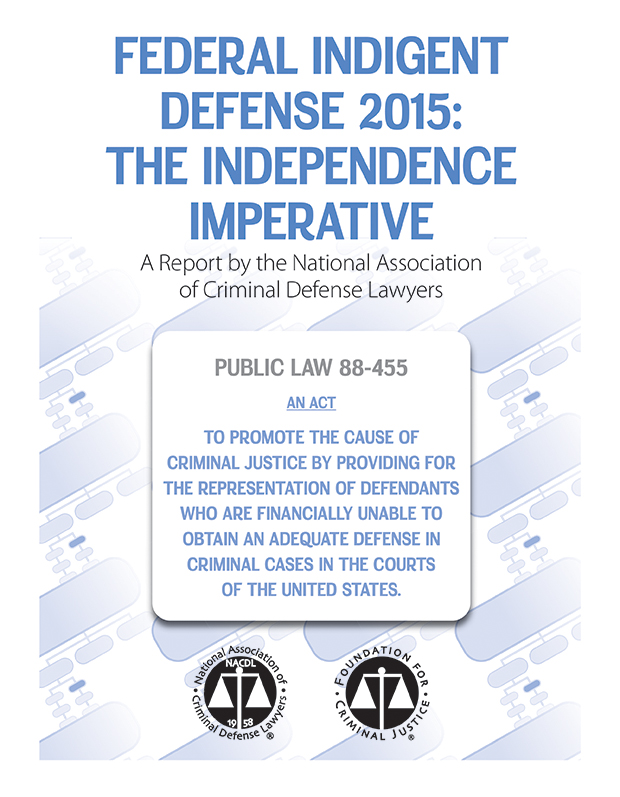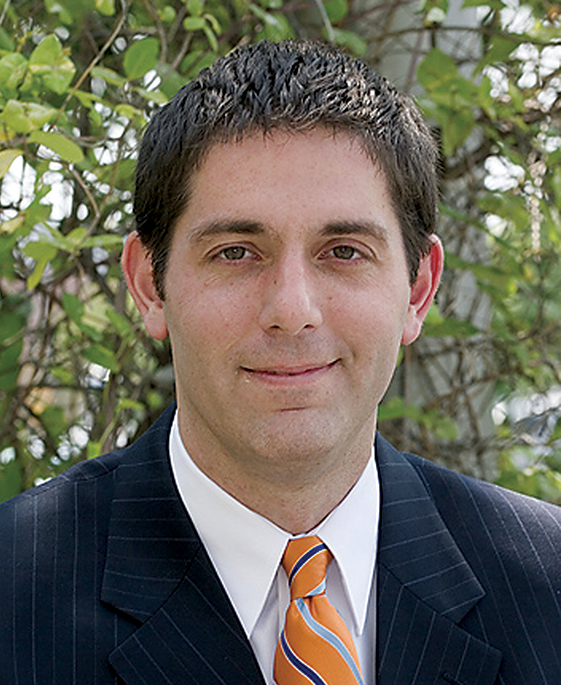Access to The Champion archive is one of many exclusive member benefits. It’s normally restricted to just NACDL members. However, this content, and others like it, is available to everyone in order to educate the public on why criminal justice reform is a necessity.
NACDL Releases Federal Indigent Defense 2015: The Independence Imperative
The passage of time and an infusion of funding can mask even the most serious problems. And so it is with the federal indigent defense system. For many, the traumatic events of 2013, which subjected the federal indigent defense system to grave risk, have receded into memory. It is already difficult to recall the frenetic efforts to preserve the federal indigent defense infrastructure that were triggered by the twin perils posed by judicial demotion of the defender function and the dire consequences of the executive and legislative suicide mission known as sequestration. The federal budget agreement in 2014 and the concomitant restoration of funding for federal indigent defense calmed the tempest, with the attention of most criminal justice advocates diverted to other pressing issues. But for NACDL, which had established a Task Force on Federal Indigent Defense in response to the crisis, the work continued. The result of that effort is a comprehensive report on the state of federal indigent defense: Federal Indigent Defense 2015: The Independence Imperative.1
Background
For many years, those who have grappled with the indigent crisis in the states looked with envy at the federal indigent defense system. Dating back to the Criminal Justice Act of 1964, and augmented by key amendments in 1970, which established the authority to create federal defender offices and federal community defender organizations, the federal system established an infrastructure, a reasonably dependable funding stream, and a healthy mix of institutional defenders and private assigned attorneys. Some viewed this as the gold standard for indigent defense, and compared to the woefully inadequate and chaotic approach to indigent defense throughout the states and counties, it is hard to argue with that characterization. But that is a misleading litmus test. Many have long lamented that the federal system does not honor the first principle of the ABA Ten Principles of a Public Defense Delivery System: independence.2 Many worried that subjugating the implementation of the constitutional right to counsel to control by the judiciary — the very judges before whom defense counsel must litigate in adversarial proceedings against the government — presented an inherent conflict. Despite the best of intentions by the nation’s federal judiciary, many worried that circumstances could arise that would severely threaten the implementation of the Sixth Amendment on the federal level.3
 www.nacdl.org/federalindigentdefense2015
www.nacdl.org/federalindigentdefense2015
Indeed, in 2013 those circumstances did arise. With sequestration and the prospect of severe across-the-board spending cuts looming, the Administrative Office of the United States Courts (AO) demoted the Office of Defender Services from a “district high-level office” within the AO to one of many “Program Services,” like probation and pretrial services. And then sequestration hit. The manner in which budget cuts were implemented had extremely detrimental impacts on both defender offices and panel attorneys. Many defender offices were decimated. Many public and private defenders were personally hard hit. And, of course, the adverse impact on the most important constituency — the indigent accused — was incalculable. The federal indigent defense community and its supporters frantically sought support for efforts to restore funding and staunch the bleeding. Many individuals and groups responded — including NACDL.
The Task Force on Federal Indigent Defense
NACDL launched an intensive and focused effort to rally support for the federal indigent defense system. The catalogue of NACDL initiatives is a matter of public record,4 and included advocacy in the media and with Congress, as well as multifaceted efforts to preserve the cohesive partnership of public and private attorneys in service to the indigent accused. Among the most important and enduring initiatives was the establishment of a Task Force on Federal Indigent Defense by then-NACDL President Jerry Cox. The task force was directed to examine broadly the federal indigent defense system, not just the immediate concerns with the demotion of the defender function and the impact of sequestration, but the entire manner in which the federal indigent defense system operates. The mission included an assessment of the level of independence afforded to the Defender Services Office and consideration of whether reforms are necessary to ensure compliance with the ABA Ten Principles.
Bonnie Hoffman, a deputy public defender in Loudon County, Va., served as chair of the task force. A talented array of lawyers joined her, including defenders, panel attorneys, and members of the private bar: Willis G. Coffey, Josh A. Cohen, Jerry J. Cox, Michael P. Heiskell, Norman R. Mueller, David Patton, David M. Porter, Cynthia W. Roseberry, Ronald Tyler, Susan J. Walsh, Lisa Monet Wayne, and William P. Wolf (vice chair). Professor Joel M. Schumm of the Indiana University Robert H. McKinney School of Law served as the reporter for the project.
Over the course of 18 months, the task force interviewed more than 130 individuals, including judges, full-timer defenders, panel attorneys, Administrative Office of the United States Court personnel, and others whose work intersects with the federal indigent defense system. The survey garnered information from a diverse array of stakeholders with representatives from all federal judicial circuits and 49 of the 50 states. In addition, the task force reviewed countless reports and documents, and fully investigated the multitude of concerns expressed. To gain the broadest possible perspective, the task force relied upon personal interviews, surveys and extensive outreach to judges, lawyers, and administrators who have worked within the system. The result is perhaps the most comprehensive look at the federal indigent defense system in two decades. The Federal Indigent Defense 2015 report includes a series of specific recommendations to strengthen the system and to minimize the risk of a repetition of the cataclysmic events of 2013 or other incursions on the fulfillment of the right to counsel in federal courts.
Findings and Recommendations
The report catalogues the unique strengths of the federal indigent defense infrastructure — and there are many. It is undeniable that the federal system is far superior to what exists throughout much of the nation on the state and county levels. Overall, the report recognizes that the federal system has attracted a strong cadre of federal defenders and panel attorneys. In most jurisdictions, it provides a robust hybrid system combining a full-time defender office and a panel of private bar members, which is essential to providing a stable, effective and independent defense presence.

Bonnie Hoffman
Chair, Task Force on Federal Indigent Defense

Joel M. Schumm
Reporter, Task Force on Federal Indigent Defense
Still, the fact that the federal indigent defense system is better than others is no reason to ignore its shortcomings or the fundamental flaws that can imperil the system. Thus, an overarching finding is that from the national level to the individual district courts throughout the nation, it is judges, rather than defense attorneys or others appointed to represent and protect the interests of defendants, who manage the nation’s federal indigent defense system. Further, the operation of many of the entities within the judicial branch is not transparent, and administrators often lack expertise or sensitivity with respect to defense issues. As a consequence, many aspects of the federal indigent defense system — and the individual lawyers practicing within that system — are subjected to troubling judicial control that manifests itself in myriad ways, all of which imperil the independence of the defense function. The problem is further complicated because, as one high AO official put it, each judge operates his or her own “fiefdom,”5 thus limiting the authority of the central administration to effectuate reform. The report concludes that treating the defense function as similar to court clerks or probation ignores the unique constitutional ordained role and obligation of defenders to carry out a client’s wishes, act as a zealous advocate, and fulfill the unique role of the defense attorney.
The report articulates seven fundamental principles that are essential to ensure a robust federal indigent defense system and provides specific recommendations for how to implement them. These core principles will also guide NACDL’s advocacy in this important area in the coming years:
- Control over federal indigent defense services must be insulated from judicial interference.
- The federal indigent defense system must be adequately funded.
- Indigent defense counsel must have the requisite expertise to provide representation consistent with the best practices in the legal profession.
- Training for indigent defense counsel must be comprehensive, ongoing, and readily available.
- Decisions regarding vouchers (i.e., payment to panel attorneys) must be made promptly by an entity outside of judicial control.
- The federal indigent defense system must include greater transparency.
- A comprehensive, independent review of the CJA program must address the serious concerns discussed in this report.
The last of these principles is timely and keenly focused on a development that occurred while the task force was conducting its review. Notwithstanding the recommendation of the Prado Commission in 1993 that the federal system should be reviewed every seven years, no such review has been undertaken in more than 20 years.6 Whether by coincidence or consequence, as the task force was concluding its investigative phase and deep in deliberations as to the contours of the final report, the AO announced that a new study would be undertaken. This is a welcome development, and may provide a perfect opportunity to address the concerns articulated in Federal Indigent Defense 2015. As noted in the report, however, the review committee is heavily populated by judges, and thus there are reasons for concern.7 It certainly raises questions as to whether the composition comports with the Prado Commission recommendation for a review by “an impartial entity.” But the project should not be prejudged, and all individuals concerned with ensuring a strong and independent indigent defense system should engage the process.
As this review committee goes about its work, all stakeholders must be clear-headed and forward-thinking. They must absorb the lessons of the recent past and ponder how future budgetary or political upheaval may impact the Sixth Amendment right to counsel if it remains merely a program service within the judiciary’s vast administrative structure.
Notes
- Read the report at www.nacdl.org/federalindigentdefense2015.
- The ABA Ten Principles of a Public Delivery System, Principle 1: The public defense function, including the selection, funding, and payment of defense counsel, is independent.
- In 1993, a Committee to Review the Criminal Justice Act (known as the Prado Committee, named for its chair, Judge Edward C. Prado, then a district judge in the Western District of Texas and a member of the AO’s Defender Services Committee) called for numerous reforms, including the establishment of a new and independent Center for Federal Criminal Defense Services. Report of the Committee to Review the Criminal Justice Act, published in the Criminal Law Reporter, Volume 52 (1993). This independence proposal was rejected by the Judicial Conference of the United States. The Judicial Conference did, however, accept a recommendation that comprehensive review of the CJA program should be undertaken every seven years by “an impartial entity.” See Prado Report, pages 15-16. As discussed in this article, no such review was undertaken until the recent establishment of a committee to review the program — more than 20 years after the Prado recommendation.
- NACDL’s efforts to restore funding are described at https://www.nacdl.org/indigentdefense/federalcrisis/.
- “Judge Bates, former director of the AO and a long-time district court judge, told the task force that the AO has emphasized educating the judiciary about ‘fairness’ and ‘proper examination’ of vouchers, but the AO could not impose upon district judges a national standard because ‘district courts are fiefdoms’ — i.e., they are independent of each other and have unique circumstances.” Nat’l Ass’n of Crim. Def. Lawyers, Federal Indigent Defense 2015: The Independence Imperative 50 (2015) [hereinafter Federal Indigent Defense 2015].
- See supra text accompanying note 3.
- Federal Indigent Defense 2015, supra note 5, at 11.
About the Author
Norman L. Reimer is NACDL’s Executive Director and Publisher of The Champion.
Norman L. Reimer
NACDL
1660 L Street, NW, 12th Floor
Washington, DC 20036
202-465-7623
Fax 202-872-8690
nreimer@nacdl.org













